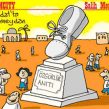
Iraqi Journalist’s Shoes Make Turkish Media Happy
Publication: Eurasia Daily Monitor Volume: 5 Issue: 239
By:

Muntader al-Zaidi, the Iraqi journalist who threw his shoes at President Bush during a joint press conference with Iraqi Prime Minister Nuri al-Maliki on December 14, has suddenly become a “poster boy” for Turkish newspapers. Almost all newspapers, from center-left to Islamist, underline the symbolic significance of the act as a form of Iraqi resistance toward the U.S. Hurriyet, a leading newspaper, had the headline “World Shoe Day” and underlined the symbolic effect of the incident on the Iraqi resistance (Hurriyet, December 16). The headline of the center-left Radikal was “The Shoe Has Become the New Flag for Anti-Bush People in the Middle East” (Radikal, December 16). Under the headline “Shoe Rebellion,” the center-right Bugun claimed that a million dollars had been offered for the shoes that were thrown at Bush (Bugun, December 16). The editor-in-chief of Bugun said that the shoe incident had united the Iraqi people for the first time in 30 years (Bugun, December 16).
The shoe protest has suddenly united Turkish commentators, almost all of whom have commented that by journalistic standards the protest was unacceptable albeit well deserved. The influential commentator Fikret Bila of Milliyet said that President-elect Barack Obama “should think about why Iraqis are supporting al-Zaidi’s protest. Obama should find a way to withdraw American troops from Iraq without further insults” (December 16). Another influential commentator opined, “I am very sure that millions of people on earth would want to do the same. I believe that those who watched the protest on TV said ‘Ohh be! [a deep thank you], he deserved it.’ I have not seen any TV station that blamed the journalist. Those shoes should gratify the feelings of a majority of the people toward Bush” (Guneri Civaoglu, Milliyet, December 16). Derya Sazak of Milliyet referred to it as a well-deserved goodbye ceremony for Bush. “During the press conference, Bush said. ‘I do not understand what his problem was.’ What impudence! It seems that he does not realize what his policies have brought to Iraq” (Milliyet, December 16).
The editor-in-chief of Sabah said that “the protest reflected the feeling of a majority of Iraqis toward Bush. The shoe showed what terrible policies the Bush administration exercised in Iraq” (Sabah, December 16). Mustafa Balbay of Cumhuriyet maintained that “the shoe protest is the beginning of a new era that has re-ignited anti-American sentiments once again” (Cumhuriyet, December 16). A commentator from Hurriyet drew a parallel between the Iraqis hitting Saddam Hussein’s statue with their shoes when American soldiers toppled it from its base and al-Zaidi’s throwing his shoes at Bush (Hurriyet, December 16). Fehmi Koru, an influential commentator who is known for his close ties with President Abdullah Gul and Prime Minister Recep Tayyip Erdogan, pointed out that “those shoes were thrown not only at Bush but [also at] his neo-conservative team and their supporters around the world” (Yeni Safak, December 16). Perhaps the incident was best depicted by a cartoonist, who depicted a shoe as the statue of liberty in the center of a Baghdad square (Sabah, December 16).
It can be concluded from the Turkish media’s reaction to the incident that anger toward the Bush administration is rampant across the entire ideological spectrum. Whenever such negative incidents have occurred in previous years, Turkish journalists and commentators attacked the United State in general. This time, however, with few exceptions, they made Bush and his administration the target of the protest, rather than the United States as a whole. Moreover, most of the commentators pointed to the fact that hitting someone with a shoe is a particularly strong reproach in Arab culture.
The shoe protest has once again shown how the Bush administration has united many in the Islamic world against America. It has laid a huge burden on the shoulders of the incoming Obama administration to reverse the anti-American sentiment in Islamic countries. The Turkish press reported that Obama was considering organizing a big rally in the Muslim world, possibly in Istanbul, as a means of curbing anti-Americanism (Yeni Safak, December 13). The reactions to the shoe incident show that the Obama administration must in any case do something to curtail such sentiments sooner rather than later. Certainly a big rally in a symbolic place, such as Sultan Ahmet Square in Istanbul, would be a good symbolic gesture to begin wi




